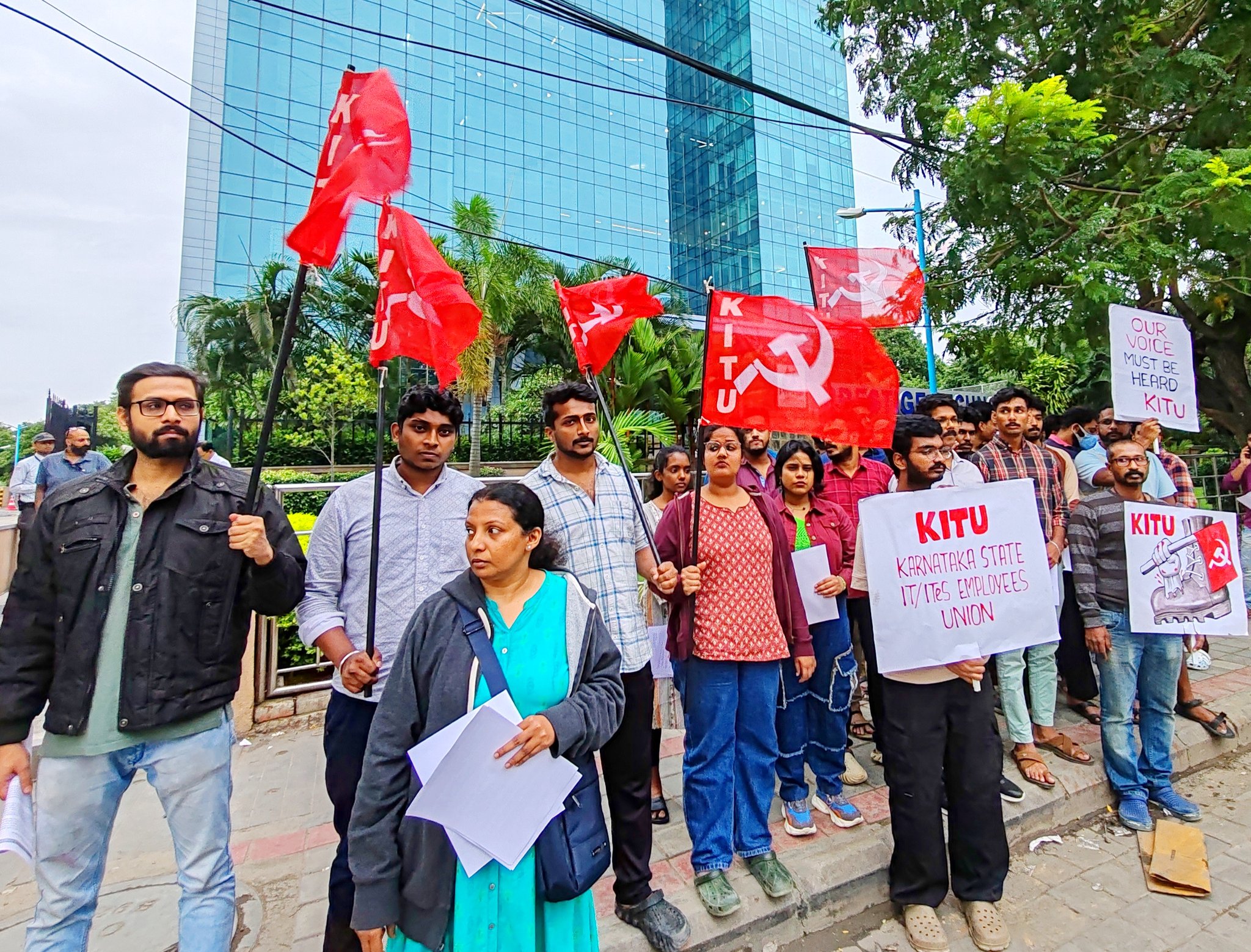14 Hours A Day, The New Work Proposal For Techies That The Karnataka Govt Proposes; Too Tall An Order, What Do Techies Say?
The 14-hour work day proposal by Karnataka CM Siddaramaiah has caused much uproar in the IT sector; employees and trade unions are up in arms, calling it "inhuman" and "slave-like." At the same time, Karnataka CM Siddaramaiah and his government are yet to comment on the issue

Can you imagine a rule requiring one to work 14 hours a day and 70 hours a week? Well, if the Karnataka government has its way, this is precisely what the plans are.
The proposal comes against the backdrop of a significant backlash that led the Karnataka government to suspend a new bill mandating reservation for Kannadigas in private industries.
However, with the second proposal, the state is now facing potential controversy over a proposed amendment that could extend working hours for tech professionals. The amendment would allow tech workers to work up to 14 hours a day and 70 hours a week.
Nonetheless, the proposal has already sparked resistance from IT sector employees and trade unions, who have criticized it as “inhuman.”
The chief minister, Siddaramaiah, and his administration have yet to issue a statement on the matter.

So what is this new proposal?
The Karnataka State IT/ITeS Employees Union (KITU) has indicated that the state government plans to amend the Karnataka Shops and Commercial Establishments Act, 1961, to permit employees in the IT/ITeS/BPO sectors to work more than 12 hours a day and up to 125 hours in any three-month period.
This proposal led the union representatives to meet with various officials to voice their opposition, including state labour minister Santosh Lad, labour department principal secretary Mohammad Mohsin, and IT-BT Department principal secretary Ekroop Kaur.
According to a report, the labour department has called a meeting with industry stakeholders to discuss the proposal, which could impact Bengaluru, the country’s leading IT hub.
The proposed amendment also has legal implications as it would require altering the existing law, which currently limits work to a maximum of 10 hours per day, including overtime.
Hence, unions argue that this new proposal effectively seeks to normalize a 14-hour workday, which would significantly change the legal framework.
They have, in fact, gone on to describe the proposed amendment as the “biggest ever attack on the working class,” warning that it could lead to the adoption of a two-shift system instead of the current three-shift system, potentially resulting in workforce reductions.
Union representatives have also raised concerns about the potential health impacts of the proposed extension of working hours, emphasizing that the IT sector is already struggling with poor physical and mental health.
They referenced studies to support their argument, noting that longer hours could exacerbate issues such as stroke, heart disease, and depression.
According to a report from the Karnataka Chamber of Commerce and Industry (KCCI), 45% of IT sector employees are experiencing mental health issues like depression, and 55% are dealing with physical health problems.
The Karnataka State IT/ITeS Employees Union (KITU) pointed out that the World Health Organization and International Labour Organization have found that extended working hours are associated with a 35% higher risk of stroke and a 17% higher risk of ischemic heart disease.
The unions have called on Chief Minister Siddaramaiah to reconsider the proposal, warning that it would pose a severe challenge to the 2 million employees in the IT/ITeS sector in Karnataka.
They urged workers to unite and resist what they described as an “inhuman attempt to impose slavery.”
Labour Minister Santosh Lad, however, stated that the proposal is still under discussion. “A proposal to extend work hours to 14 hours has been presented, but discussions are ongoing,” he stated.
The proposal comes at a time when there is increasing awareness among younger workers about the negative impacts of extended working hours on productivity and health, especially in the wake of the Covid pandemic, which introduced hybrid and remote work models.
The debate over working hours has been further fueled by Infosys co-founder Narayana Murthy’s recent remarks about working 14-hour days, although he later clarified that he was referring to productivity.
Former Infosys board member TV Mohandas Pai has also made similar statements regarding work hours and productivity, arguing that working long hours is essential for making an impact in the early years of one’s career.
He suggested that work-life balance is important, but being productive is crucial for job security.

The Viewpoint
The proposal to extend working hours in Karnataka’s IT sector to up to 14 hours per day and 70 hours per week raises several concerns.
Does the Proposal Make Sense?
On the surface, extending working hours might seem like a way to boost productivity and meet high demand, particularly in the tech industry where project deadlines and client needs can be intense.
Hence, it would seem that longer hours could lead to increased output and potentially higher revenues for companies; however, this perspective may overlook several crucial factors.
Research consistently shows that hourly productivity declines after a certain point, and working excessively long hours can lead to burnout, ultimately reducing overall productivity and effectiveness.
Thus, it directly contradicts the above viewpoint.
Also, the proposal does not account for the physical and mental health impacts of extended work hours.
Evidence links long working hours to higher risks of chronic conditions like cardiovascular disease, depression, and stroke, issues that the union has already underlined; these health issues can also lead to increased absenteeism and reduced long-term productivity.
Extended working hours can severely impact employees’ work-life balance, leading to dissatisfaction, decreased morale, and higher turnover rates.
In an era where work-life balance is increasingly valued, such a proposal might drive talented professionals away from the sector or the region.

Potential Negatives of the Proposal
Prolonged working hours are associated with serious health risks.
Studies have shown that working more than 55 hours a week can lead to a 35% higher risk of stroke and a 17% higher risk of ischemic heart disease. Thus, for a sector already struggling with high rates of mental health issues, this proposal could worsen the problem.
While it might seem that longer hours could lead to more output, fatigue and stress can reduce efficiency and effectiveness, and overworked employees may make more mistakes, require longer recovery times, and ultimately produce lower-quality work.
Extended hours can erode morale, leading to decreased job satisfaction and increased turnover, and high turnover rates can disrupt project continuity, impact team dynamics, and incur additional costs for recruitment and training.
The proposal might lead to unintended economic consequences as well, for instance, if employees are pushed to work excessively long hours, the costs associated with health care and reduced productivity could outweigh any short-term gains.
Additionally, companies might face increased scrutiny and potential legal challenges related to worker rights and conditions.
Longer working hours can significantly impact employees’ personal lives, affecting their ability to spend time with family and pursue leisure activities resulting in decreased overall life satisfaction and a diminished quality of life.
Such a proposal might face legal challenges and ethical scrutiny. There are established standards and regulations regarding working hours designed to protect worker well-being. Extending working hours could be seen as undermining these protections and could lead to legal disputes.
The Last Bit, While the proposal to extend working hours in Karnataka’s IT sector might be aimed at increasing productivity and meeting business demands, it presents several potential drawbacks.
These include health risks, decreased productivity, negative impacts on employee morale, economic implications, and potential legal challenges.
Thus, a more balanced approach that considers both the needs of businesses and the well-being of employees may be a more sustainable and effective solution rather than a blanket rule!




